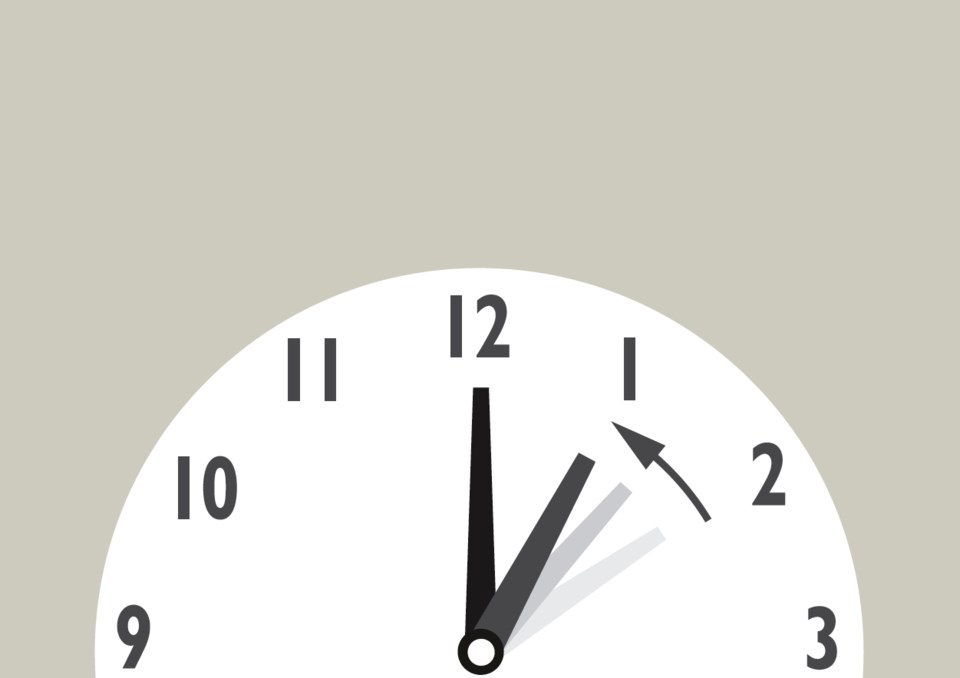Good morning. Did you remember the time change?
Did you fall back to bed, grateful for another hour between the sheets, or did you do like a guy I know, who would prefer to remain nameless, but is in fact Times Colonist reporter Jeff Bell, and show up for your soccer game and wonder where the rest of the team was?
Today’s is supposed to be the Good Time Change (unless you work in a bar and had to stay late last night, watching the drunks get drunker after the clock rolled back at 2 a.m.). The autumnal shift is the one we like, the one where they dole out an extra hour’s sleep like an early Christmas bonus.
Except that’s not the way it really works, is it? In reality, you wake up at the same time as usual, because that’s when your internal alarm clock rings.
And by “same time as usual” I mean 3 a.m., because that’s Groundhog Day predictable for far too many bleary-eyed Canadians.
“Short sleep duration and poor sleep quality are prevalent among Canadian adults,” said a recent Statistics Canada study. It found 43 per cent of men and 55 per cent of women aged 18 to 64 have trouble nodding off or staying asleep.
Daylight Time, Pacific Time, John Horgan Time, whatever: They don’t mean a thing when the whimsical sleep gods decide to pop you out of bed like a bagel from a toaster. And not even reading Statistics Canada studies can return the afflicted to dreamland.
In the olden days, we would try to get back to sleep by counting sheep. (Once, I got up to 897 before I realized the sheep were messing with me, going out one ear, sneaking around behind my head and jumping in the other ear to make it look like there were more of them than there really were, just like clowns in a circus car.)
We abandoned the sheep after we discovered late-night/early-morning television (when the Slap Chop guy, Suzanne Somers and a sweating evangelist would all stay up to keep you company) and, worse, the internet. Turning to the internet to cope with sleep deprivation is like trying to lose weight with ice cream. Followed by cheesecake. Followed by poutine. (And let’s not even talk about Netflix, which is like eating all the leftover Halloween candy at once: “Do you want to watch the next episode? How about another little Oh Henry bar?”)
I once made the mistake of not only exploring the 4 a.m. internet, but looking up insomnia on one of those health sites that hypochondriacs love and doctors hate.
“One of the most common causes of chronic insomnia is depression,” it said. “Other underlying causes include arthritis, kidney disease, heart failure, asthma, sleep apnea, narcolepsy, restless-leg syndrome, Parkinson’s disease and hyperthyroidism.”
Super. Forget falling asleep, now I was worried about never waking up again.
I toddled back to the bedroom, turned on the light. “Brace yourself,” I told her. “I have arthritis, kidney disease, heart failure, asthma, sleep apnea, narcolepsy, restless-leg syndrome, Parkinson’s disease and hyperthyroidism. I’m probably going to croak soon.”
“What time is it,” she mumbled into her pillow.
“4:23 a.m.,” I said.
“Then you’re definitely going to croak soon,” she replied. “Probably within the next couple of minutes.”
This was comforting, as sometimes her responses aren’t so supportive and affirming. Sometimes she’ll point out that I wouldn’t wake up at 4 if I didn’t nod off by the end of Jeopardy. She’ll argue that I do in fact get seven hours of sleep, but that the first four come while snoring/drooling on the chesterfield, looking just like Colin Firth, only different, before suddenly lurching awake like Lazarus rising from the dead.
But I digress.
If Horgan et al really want to enact a new time change law, it should go like this: If you’re awake for two hours in the middle of the night, you get to sleep in an extra two hours in the morning.
Just amble into the office at 11 and say: “Sorry, boss, but after I finally drifted off again, I just didn’t feel like getting up in time to get here by 9.”
Go ahead, try it. The stunned silence of your boss can be taken as tacit agreement.



